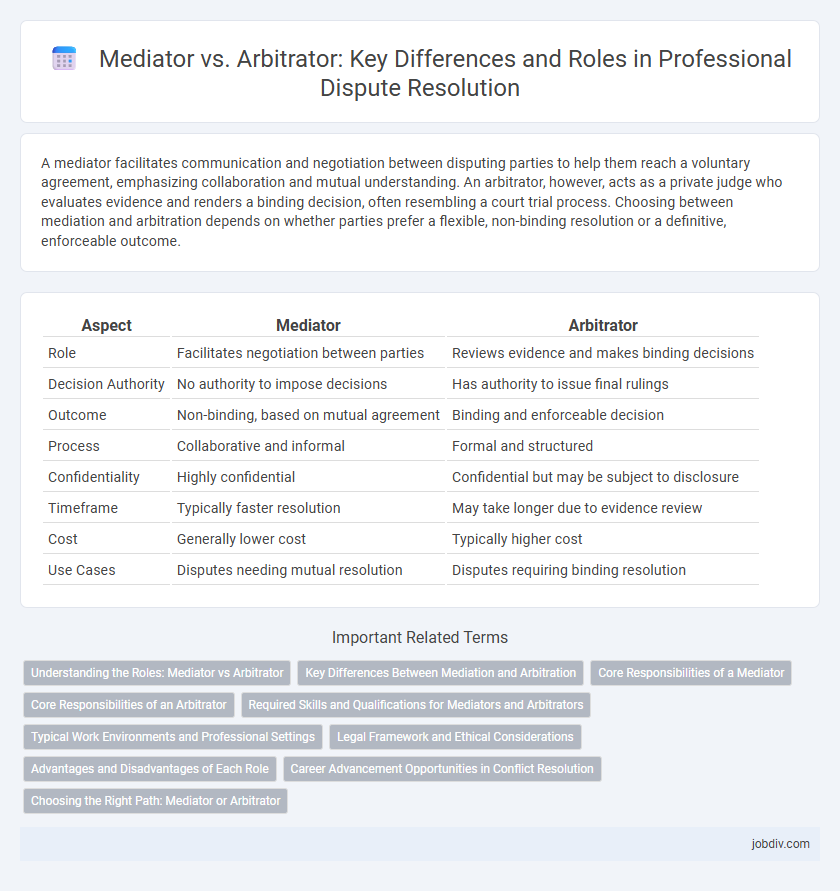A mediator facilitates communication and negotiation between disputing parties to help them reach a voluntary agreement, emphasizing collaboration and mutual understanding. An arbitrator, however, acts as a private judge who evaluates evidence and renders a binding decision, often resembling a court trial process. Choosing between mediation and arbitration depends on whether parties prefer a flexible, non-binding resolution or a definitive, enforceable outcome.
Table of Comparison
| Aspect | Mediator | Arbitrator |
|---|---|---|
| Role | Facilitates negotiation between parties | Reviews evidence and makes binding decisions |
| Decision Authority | No authority to impose decisions | Has authority to issue final rulings |
| Outcome | Non-binding, based on mutual agreement | Binding and enforceable decision |
| Process | Collaborative and informal | Formal and structured |
| Confidentiality | Highly confidential | Confidential but may be subject to disclosure |
| Timeframe | Typically faster resolution | May take longer due to evidence review |
| Cost | Generally lower cost | Typically higher cost |
| Use Cases | Disputes needing mutual resolution | Disputes requiring binding resolution |
Understanding the Roles: Mediator vs Arbitrator
A mediator facilitates communication between disputing parties to help them reach a voluntary agreement, emphasizing collaboration and mutual understanding without imposing decisions. An arbitrator acts as a private judge who reviews evidence and arguments to deliver a binding resolution, often in more formal or legalistic contexts. Understanding these roles clarifies that mediation prioritizes negotiation and consensus, while arbitration focuses on adjudication and finality.
Key Differences Between Mediation and Arbitration
Mediation involves a neutral third party facilitating negotiation to help disputing parties reach a voluntary agreement, emphasizing collaboration and confidentiality. Arbitration, by contrast, is a more formal process where an arbitrator acts as a private judge, making a binding decision after reviewing evidence and arguments. Key differences include mediation's non-binding outcome and focus on preserving relationships versus arbitration's binding decisions and structured procedures.
Core Responsibilities of a Mediator
A mediator facilitates communication between disputing parties to help them reach a voluntary, mutually acceptable agreement. They remain neutral, guiding discussions and encouraging collaboration without imposing decisions. Core responsibilities include managing dialogue, identifying underlying issues, and fostering compromise to resolve conflicts effectively.
Core Responsibilities of an Arbitrator
An arbitrator's core responsibilities include conducting a fair and impartial hearing, evaluating evidence presented by both parties, and rendering a binding decision. Unlike a mediator, an arbitrator acts as a private judge, ensuring adherence to procedural rules and legal standards throughout the dispute resolution process. This role demands expertise in the relevant legal framework and the ability to provide enforceable outcomes.
Required Skills and Qualifications for Mediators and Arbitrators
Mediators require strong communication, negotiation, and impartiality skills to facilitate dialogue and help parties reach mutual agreements, often holding certifications in conflict resolution or mediation. Arbitrators need in-depth knowledge of legal principles, analytical abilities, and decision-making expertise, typically possessing legal qualifications or specialized training in arbitration. Both roles demand high emotional intelligence and ethical standards, yet mediators focus on collaboration while arbitrators emphasize authoritative judgment.
Typical Work Environments and Professional Settings
Mediators typically operate in neutral settings such as mediation centers, law offices, or community centers where collaborative dispute resolution takes place. Arbitrators often work in more formal environments like arbitration institutions, corporate boardrooms, or legal firms where binding decisions are rendered. Both professionals engage in contract law, commercial disputes, and labor relations, yet mediators emphasize facilitation and consensus, while arbitrators focus on impartial judgment and enforceable outcomes.
Legal Framework and Ethical Considerations
Mediators operate within a legal framework emphasizing voluntary participation and confidentiality, promoting collaborative dispute resolution without binding decisions. Arbitrators, governed by arbitration laws and procedural rules, deliver binding decisions enforceable by courts, ensuring finality and legal certainty. Ethical considerations for mediators prioritize neutrality and informed consent, while arbitrators adhere to impartiality and adherence to procedural fairness under codified legal standards.
Advantages and Disadvantages of Each Role
Mediators facilitate communication and negotiation to help parties reach a mutually acceptable agreement without imposing a decision, promoting flexibility and preserving relationships but lacking binding authority. Arbitrators render binding decisions based on reviewing evidence and arguments, providing finality and legal enforceability, yet potentially fostering adversarial dynamics and reducing opportunities for collaborative resolution. Choosing between mediation and arbitration depends on factors such as desired control over outcomes, time constraints, and the importance of confidentiality versus enforceability.
Career Advancement Opportunities in Conflict Resolution
Mediator roles emphasize facilitation skills and collaborative problem-solving, making them ideal for professionals seeking careers in negotiation and diplomacy within legal and corporate sectors. Arbitrators, recognized as decision-makers with authority to impose binding resolutions, offer advancement opportunities in judiciary and regulatory agencies where formal dispute adjudication is essential. Both career paths demand expertise in conflict resolution but diverge in their applications, with mediators fostering agreement and arbitrators providing definitive conflict outcomes.
Choosing the Right Path: Mediator or Arbitrator
Choosing between a mediator and an arbitrator depends on the desired outcome and level of control over the dispute resolution process. Mediators facilitate negotiation and help parties reach a voluntary, mutually acceptable agreement, ideal for preserving relationships and fostering communication. Arbitrators render binding decisions based on presented evidence, suitable for cases requiring a definitive and enforceable resolution without prolonged litigation.
Mediator vs Arbitrator Infographic

 jobdiv.com
jobdiv.com